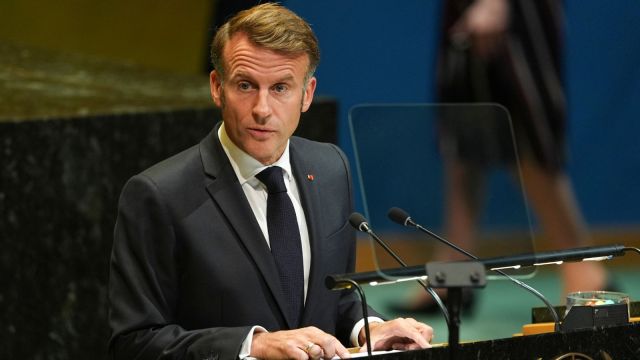France recognises state of Palestine, Emmanuel Macron tells UN general assembly
The most far-right government in Israel's history has declared there will be no Palestinian state as it pushes on with its fight against militant group Hamas in Gaza following the October 7, 2023, attack on Israel that killed some 1,200 people.
 French President Emmanuel Macron speaks during a high-profile meeting at the United Nations aimed at galvanizing support for a two-state solution to the Israeli-Palestinian conflict Monday, Sept. 22, 2025, at UN headquarters. (AP Photo)
French President Emmanuel Macron speaks during a high-profile meeting at the United Nations aimed at galvanizing support for a two-state solution to the Israeli-Palestinian conflict Monday, Sept. 22, 2025, at UN headquarters. (AP Photo) France has officially recognised a Palestinian state on Monday, joining Britain, Canada and other countries that took similar steps over the weekend, a move rejected by Israel and the United States.
French President Emmanuel Macron opened the three-hour United Nations session, co-hosted with Saudi Arabia, by saying the time had come to keep alive the possibility of a two-state solution.
“We must do everything within our power to preserve the very possibility of a two-state solution, Israel and Palestine living side by side in peace and security,” Macron told delegates. “France recognises the state of Palestine,” he added, prompting applause.

The recognition is not expected to change realities on the ground, but comes as Israel pushes ahead with a ground assault on Gaza City nearly two years into the war. Local health officials in Gaza say more than 65,000 people have been killed since Israel launched its military campaign after the Hamas attack on 7 October 2023, which left about 1,200 people in Israel dead.
Israel’s government, led by Prime Minister Benjamin Netanyahu, has said it will never accept a Palestinian state and continues to press its campaign against Hamas.
The United States and Israel boycotted Monday’s summit. Israel’s ambassador to the UN, Danny Danon, said Jerusalem would consider possible responses once Netanyahu returns from the US later this week.
“Those issues were supposed to be negotiated between Israel and the Palestinians in the future,” Danon told reporters.
US Secretary of State Marco Rubio had previously told allies that unilateral recognition of a Palestinian state would create further problems. President Donald Trump, who met Netanyahu in New York earlier this week, has not commented directly on the recognitions.
Several European countries including Andorra, Belgium, Luxembourg, Malta, Portugal and San Marino also announced recognition of a Palestinian state on Monday, ahead of the UN General Assembly. Australia, Britain and Canada had made the move over the weekend.
Israel has said these steps will undermine prospects of reaching an agreement to end the conflict.
The two-state solution was at the heart of the US-backed Oslo peace accords signed in 1993, but talks have been stalled since 2014.

Germany and Italy signalled they would not join the recognitions at this stage. A German government spokesperson said Berlin remained critical of Israeli settlement expansion but insisted that recognition should come only at the end of negotiations. Italy’s foreign ministry said such a step could be “counterproductive.”
Netanyahu said in a statement that Israel’s response to the announcements would be made public after his return from meetings in the US Israeli officials said possible measures include annexing parts of the occupied West Bank and taking specific bilateral steps against France.
Annexation, however, could risk Israel’s ties with countries such as the United Arab Emirates, which normalised relations with Israel in 2020 under the US-brokered Abraham Accords. The UAE has said further annexation would undermine those agreements.
Despite a growing number of recognitions, full UN membership for Palestine would require a vote in the Security Council, where the US holds veto power.






